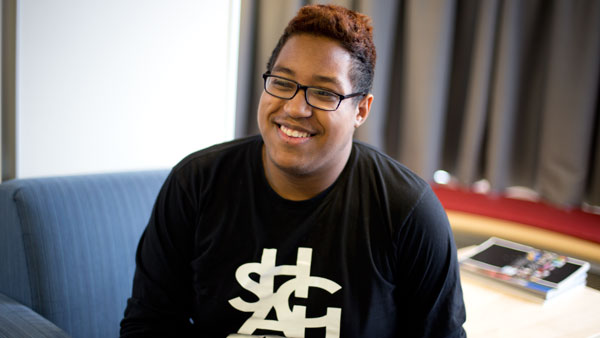Junior Aaron Lipford was recognized as a 2014 Newman Civic Fellow, a national award honoring student achievements in community service and civic engagement. Lipford, one of 197 students nationwide to receive the award, was recognized for his involvements as co-president of Created Equal, historian for the African Latino Society and a Student Leadership Consultant in the Office of Student Engagement and Multicultural Affairs.
The honor is awarded by Campus Compact, a coalition of college and university presidents committed to fulfilling the civic purposes of higher education. Newman Civic Fellows are committed to improving their communities and educating fellow students on their civic and social responsibility. Lipford has demonstrated this responsibility by channeling his passion for social justice in organizations like Books Through Bars, a local nonprofit organization.
Don Austin, assistant director of community service and leadership development in OSEMA, nominated Lipford after observing his three years of leadership in community service. As a Newman Civic Fellow, Lipford will connect with other award winners through an online community to share community service experiences. The goal of the network of scholars is to further improve each fellow’s service to his or her respective communities.
Staff Writer Ciara Lucas spoke to Lipford about his motivation to begin community service, current projects and future plans for the award recipient.
Ciara Lucas: Tell me about the community service you have participated in while at Ithaca College.
Aaron Lipford: For the past three years, I have been participating with Books Through Bars, which is a non-profit organization that focuses on packaging books for prisoners across seven different states across the northeast. It focuses on ideologies that form the prison-industrial complex and tries to deconstruct it. Books Through Bars is also a resource for prisoners to gain knowledge who don’t have access to books, libraries or legal resources.
CL: What inspired you to begin that service?
AL: It was during my sophomore year that I really looked at what had an impact on my life and how I could alleviate a lot of the systems. My brother was incarcerated. He was telling me all about how he didn’t have resources for books, and we were trying to send him things, but it became very difficult. So I started looking up resources within the Ithaca area I could try to get involved in. I even talked to Don Austin about leadership involvement, and he pointed me in the direction of Books Through Bars. That’s really how I became involved.
CL: How does it feel to be a Newman Civic Fellows Award recipient?
AL: I am very grateful and thankful for the award. It makes me want to continue doing the work I am involved in within another system because, unfortunately, Books Through Bars is closing. I am still working to see how I can keep the system alive … Being a Newman Civic Fellows Award recipient has allowed me to have resources and connections to other students that participate in community service and face problems. I am able to relate to issues that have had an impact on them and negotiate how they may be fixed.
CL: How has your service had an impact on your experience at the college?
AL: It has really had a personal impact on me, by looking into how I benefit from my own privilege. It has also motivated me to try to find a way to build a community. I’ve learned to think critically and deconstruct ideas from being a part of the Martin Luther King, Jr. Scholars program, but another aspect is to build something off of an idea that already exists. So that has inspired me to look into my own community and backyard and see what I could build from my experiences. Community service has also made me humble and empowered. It has empowered me to see that I can actually do something with the knowledge I’ve been given.
CL: What other organizations are you a part of that have contributed to your community service? Do any of them intersect?
AL: The Created Equal organization definitely does. We focus on issues within the LGBT community, and at one point we tried to do a book drive through Books Through Bars. We tried to get more LGBT resources within prisons.
CL: What can we expect to see from you in the future?
AL: I’m still working with Books Through Bars until they go on hiatus. We are in the process of creating a five-year plan to help the organization restart. The break is in order for us to figure out what problems we face and how can we still use the books.








